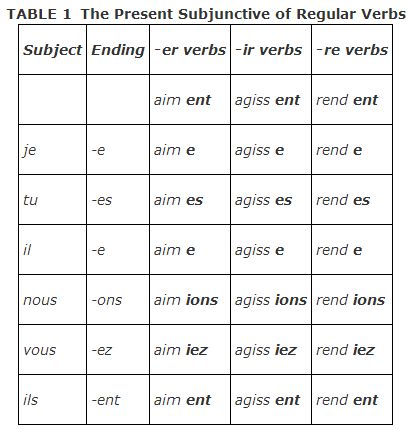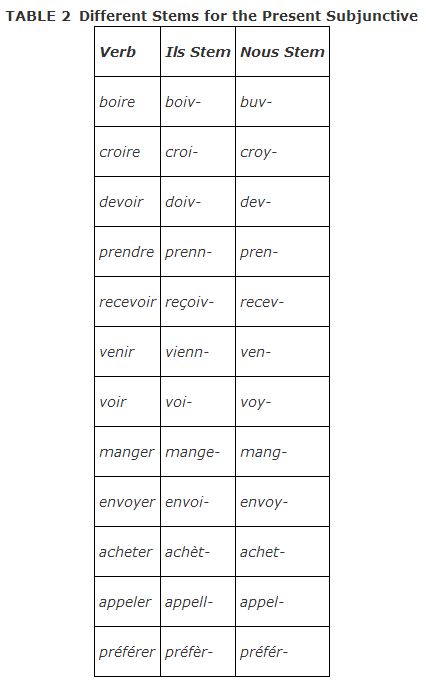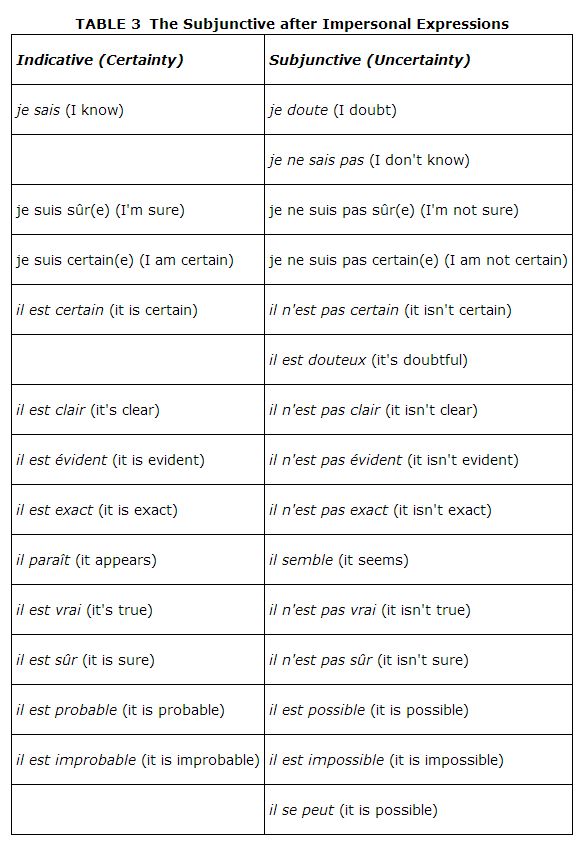The present subjunctive of regular verbs and of many irregular verbs is formed by droping the ‐ ent from the third person plural (ils/elles) form of the present tense and adding the following endings, as shown in Table 1.

Some irregular verbs and some verbs with spelling changes use two different stems (the verb forms to which endings are added) to form the present subjunctive, as shown in Table 2.

- The ils stem of the present tense for je, tu, il/elle/on, ils/elles
- The nous form of the present tense for nous and vous
Some verbs are completely irregular and must be memorized.
- aller: j'aille, tu ailles, il aille, nous allions, vous alliez, il aillent
- vouloir: je veuille, tu veuilles, il veuille, nous voulions, vous vouliez, ils veuillent
- faire: je fasse, tu fasses, il fasse, nous fassions, vous fassiez, ils fassent
- pouvoir: je puisse, tu puisses, il puisse, nous puissions, vous puissiez, ils puissent
- savoir: je sache, tu saches, il sache, nous sachions, vous sachiez, ils sachent
- avoir: j'aie, tu aies, il ait, nous ayons, vous ayez, ils aient
- être: je sois, tu sois, il soit, nous soyons, vous soyez, ils soient
Remember that the subjunctive form of the verb must be joined to another clause by que.
After impersonal expressions
The subjunctive is used in the clause introduced by que after impersonal expressions that show opinion, doubt, need, or emotion: Il est important que vous étudiiez. (It is important that you study.)
- il est absurd (it is absurd)
- il est amusant (it is amusing)
- il est curieux (it is curious)
- il est dommage (it is a pity)
- il est douteux (it is doubtful)
- il est essentiel (it is essential)
- il est étonnant (it is amazing)
- il est étrange (it is strange)
- il est gentil (it is nice)
- il est impératif (it is imperative)
- il est important (it is important)
- il est impossible (it is impossible)
- il est injuste (it is unfair)
- il est intéressant (it is interesting)
- il est ironique (it is ironic)
- il est juste (it is fair)
- il est naturel (it is natural)
- il est nécessaire (it is necessary)
- il est normal (it is normal)
- il est possible (it is possible)
- il est préférable (it is preferable)
- il est regrettable (it is regrettable)
- il est surprenant (it is surprising)
- il est temps (it is time)
- il est urgent (it is urgent)
- il est utile (it is useful)
- il convient (it is fitting)
- il faut (it is necessary)
- il vaut mieux (it is better)
For many impersonal expressions, c'est may be used in place of il est: C'est étrange qu'il ne vienne pas. (It's strange that he isn't coming.)
After verbs and expressions of doubt, denial and disbelief
The subjunctive is used after verbs and expressions of doubt, denial, and disbelief. The indicative tenses, which state facts (present, passé composé, imperfect, and future) are used after verbs and expressions of certainty and probability. When these verbs and expressions, shown in Table , are used in the negative or the interrogative, they imply uncertainty or doubt and require the subjunctive. On the contrary, when doubt is negated, certainty or probability exists and the indicative is used:
- Subjunctive: Il doute que je fasse de mon mieux. (He doubts that I'll do my best.)
- Future: Il ne doute pas que je ferai de mon mieux. (He doesn't doubt that I'll do my best.)

The subjunctive expresses an action viewed as potential and whose realization is doubted or uncertain. The desired purpose or end may never be met. You can sense a distinct difference in mental outlook between the indicative il est probable (it is probable) and the subjunctive il est possible (it is possible).
- Il est probable que tu réussiras. (It is probable that you will succeed.)
- Il est possible que tu réussisses. (It is possible that you will succeed.)
That same difference exists between the indicative il paraît (it appears) and the subjunctive il semble (it seems).
After verbs of opinion or knowledge, such as penser (to think), croire (to believe), and espérer (to hope), the indicative or the subjunctive is chosen depending upon the meaning of certainty or uncertainty that the speaker wishes to convey. Used affirmatively, these verbs usually require the indicative because they show belief, conviction, or knowledge on the part of the speaker: Je crois que tu gagneras le match. (I believe you'll win the match.) Used negatively or interrogatively, these verbs usually (but not always) take the subjunctive because they convey doubt or uncertainty:
- The speaker has no doubt: Crois‐tu qu'elle dit la vérité? (Do you believe she is telling the truth?)
- The speaker has doubts: Crois‐tu qu'elle dise la vérité? (Do you believe she is telling the truth?)
After a wish or a command
The subjunctive is used in the clause following verbs expressing a wish, request, command, permission, prohibition, preference, or desire:
Consider the following examples of using the subjunctive after a wish or command:
- Il préfère que nous restions ici. (He prefers us to stay here.)
- Elle insiste que vous fassiez le travail. (She insists that you do the work.)
After verbs and expressions of emotion and feeling
The subjunctive is used after verbs and expressions of emotion and feeling, as in the following:
- enchanté(e), ravi(e) (delighted)
- irrité(e), énervé(e) (irritated)
- malheureux(euse) (unhappy)
- mécontent(e) (displeased)
Do the following to properly express emotions:
- Use the subject pronoun + être (conjugated) + adjective + que + …: Je suis triste qu'il soit malade. (I'm sad that he's sick.)
- Use avoir instead of être with peur (fear) and honte (shame): Il a honte que vous pleuriez. (He is ashamed that you are crying.)
After certain conjunctions
Conjunctions are words that connect and relate vocabulary words and pronouns and that connect two clauses in a sentence. They are invariable; that is, their spelling never changes. The subjunctive is used after conjunctions that express the following:
Time: jusqu'à ce que (until), avant que (before)
- J'attendrai jusqu'à ce qu'il vienne. (I'll wait until he comes.)
Purpose: pour que (in order that)
- Je partirai afin qu'il puisse dormir. (I'll leave so that he can sleep.)
Concession: bien que (although)
- Il ira bien qu'il soit malade. (He'll go, although he's sick.)
Negation: sans que (without)
- Il est arrivé sans qu'elle le sache. (He arrived without her knowing it.)
The following conjunctions take the indicative:
- aussitôt que (as soon as)
- tandis que (while, whereas)